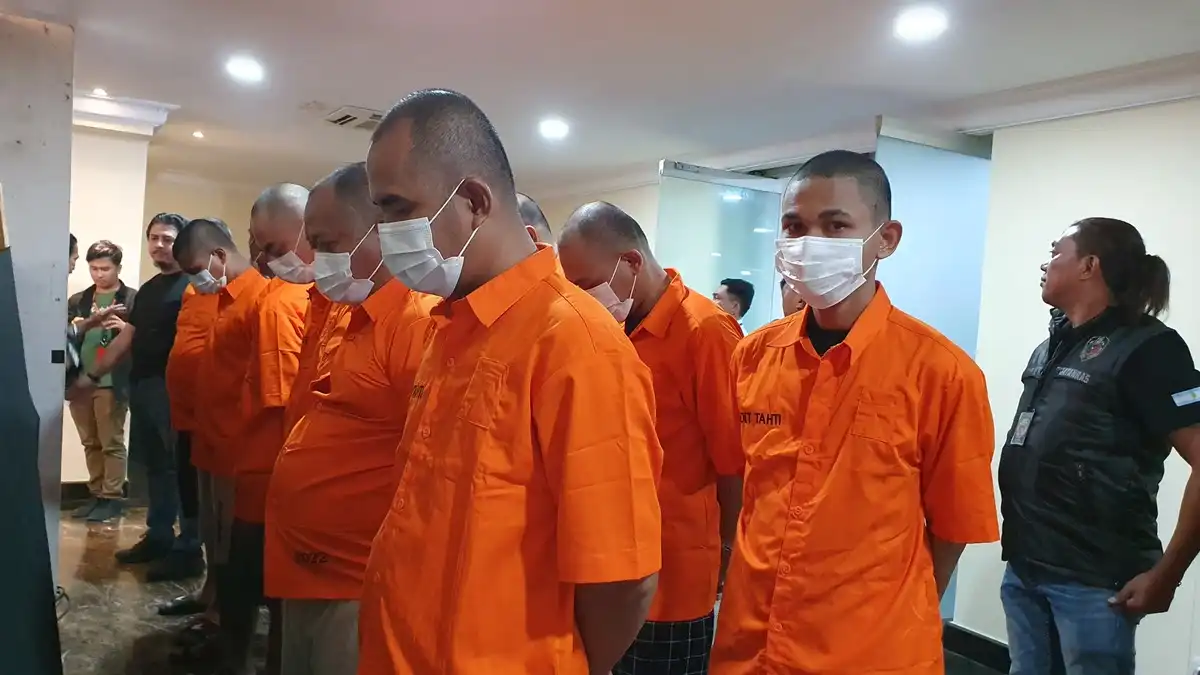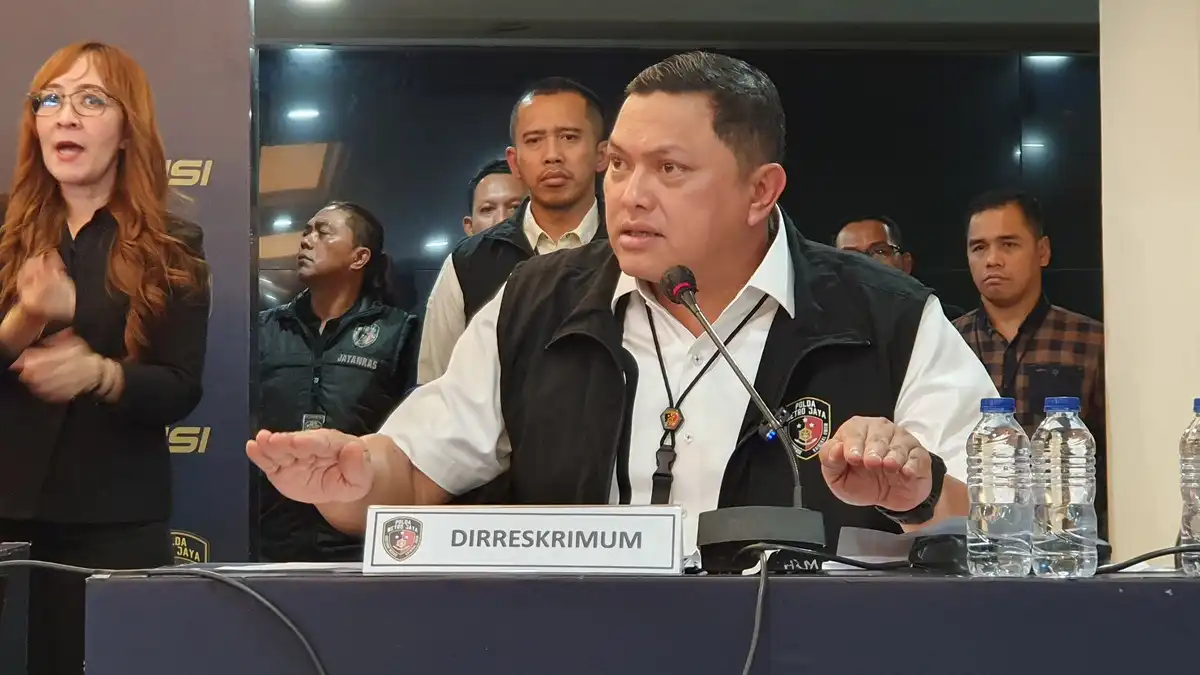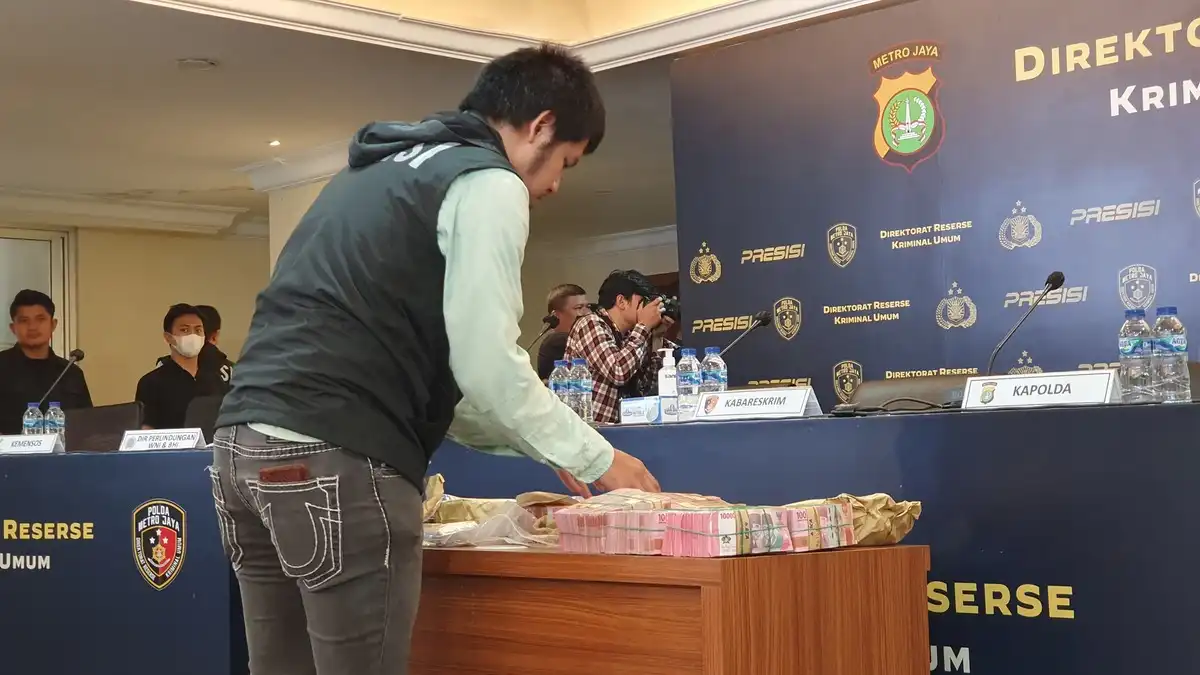Police Uncover Illegal Kidney Trade Syndicate, Arrest 12 Suspects
July 21, 2023 | 1:59 am
(photo)The Jakarta Police present the suspects of a kidney trade syndicate during a press conference in Jakarta, Thursday, July 20, 2023.
Jakarta. The Indonesian Police presented on Thursday 12 suspects believed to be members of an illegal organ trade syndicate, accused of preying on at least 122 victims and selling kidneys to a Cambodian ring.
It remains unclear how many victims have actually had their kidneys harvested and sold by the syndicate.
The identities of most of the suspects were not disclosed, but one was identified as a low-ranking police officer with the initial M.
“The policeman, who is ranked as a second sub-inspector, has instructed other suspects to get rid of their phones to evade justice. He also told them that he can deal with [law enforcement officials],” Chief Comr. Hengki Haryadi, director of the Jakarta Police’s general crime unit, said at a news conference in Jakarta.
The victims of the syndicate came from various backgrounds, including traders, teachers, and even a master’s program graduate from a reputable university in Indonesia.
“Most of them were in desperate need of money and these vulnerable individuals became the target of the syndicate,” Hengki said.
The exact pricing of the kidneys in the illicit transactions was not disclosed.
Police indicated that organ harvesting was conducted in both Indonesia and Cambodia.
After the kidneys were harvested, they were stored in a rented house in Villa Mutiara Gading housing complex in Bekasi, east of Jakarta.
It is unclear whether the organs were trafficked to overseas recipients.
In some cases, the victims were flown to Cambodia to have their kidneys removed.
“The crime was committed at a hospital that is under the authority of the Cambodian government. It’s called Preah Ket Mealea [Hospital],” said Insp. Gen. Krishna Murti, head of the National Police International Relations Division.
He said it was quite challenging to investigate the case in Cambodia and return the victims to Indonesia.
“We had to communicate with higher authorities and even with the special aide of the [Cambodian] prime minister for their assistance. We established contacts with the Cambodian Police and the country’s Interpol division, and praise be to God, this case is finally uncovered,” Krishna said.
At least six Indonesian citizens were eventually evacuated from the Cambodian hospital albeit too late — five had their left kidneys removed already, while the sixth victim lost the right kidney.
“When they were taken to the Jakarta Police upon arrival from Cambodia, they still had fresh wounds from the surgeries,” Hengki said.
The syndicate created Facebook community groups using titles like “Indonesian Kidney Donors” or “International Kidney Donors” to target and attract their victims.
National Police spokesman Brig. Gen. Ahmad Ramadhan said the illegal kidney trade case is still at the early stage of the investigation, promising to provide more details as soon as they come.
What We Know So Far about Kidney Trade Syndicate
July 23, 2023 | 1:42 am
(Photo)The Jakarta Police present suspects and evidence in an illicit kidney trade case during a press conference in Jakarta, Thursday, July 20, 2023.
Jakarta. New revelations have surfaced since police arrested 12 suspects accused of recruiting living donors and transporting them to a hospital in Cambodia for illegal kidney harvesting and trading.
Officers have disclosed shocking facts about the commercial kidney trade, which has affected as many as 122 victims known so far.
One of the suspects, identified as Hanim, 41, was presented to journalists on Friday, shedding light on the inner workings of the syndicate and how they profited from the illicit organ trade.
Who are the suspects?
Startlingly, nine of the suspects were previously victims of the same syndicate – they had sold their own kidneys and were then recruited to find more victims for financial gain, Chief Comr. Hengki Haryadi, director of the Jakarta Police’s general crime unit, said.
The syndicate utilized Facebook community groups with titles like “Indonesian Kidney Donors” or “International Kidney Donors” to target and lure their victims.
One suspect, a low-ranking officer identified only by his initial M, was responsible for ensuring no legal complications arose from the organ trade. Allegedly, he instructed other suspects on how to destroy evidence, such as cellphones, to evade police investigations.
An immigration official at Bali’s Ngurah Rai Airport, identified as HA, was also apprehended for assisting in clearing travel documents for the victims who flew to Cambodia.
The last suspect, Lukman, arranged accommodations in Cambodia.
Police have charged them with human trafficking.
How much are the kidneys sold for?
Each living donor received Rp 200 million ($13,300), but after the syndicate deducted its fee, the actual payment amounted to Rp 135 million, Hengki said.
The syndicate required the money to cover expenses for air tickets and passports for the victims. According to police estimates, the syndicate has collected at least Rp 22.4 billion ($1.5 million) from the illegal kidney trade since 2019.
Hanim, one of the suspects, stated that he was paid Rp 125 million after surrendering his kidney in 2019.
Why Cambodia?
The kidney harvesting took place at a hospital in Cambodia because it offered straightforward procedures and did not inquire about the source of the organs, according to Hanim.
Additionally, the hospital showed concern for its patients and followed up on their conditions six months after they returned to Indonesia, Hanim added.
Donors underwent comprehensive medical checkups, and several were rejected for being medically unfit to donate a kidney.
After the surgery, donors were treated for approximately five days on the fourth floor of the hospital before being discharged, Hanim said.
The Indonesian Police had previously identified Preah Ket Mealea Hospital as the facility in question, stating it was “under the authority of the Cambodian government.” Police have coordinated with Cambodian authorities and Interpol in uncovering this case.
Who are the victims?
Police revealed that the syndicate targeted 122 victims from various backgrounds, including traders, teachers, and even a master’s program graduate of a reputable university in Indonesia.
“Most of them were in desperate need of money, making them vulnerable targets for the syndicate,” Hengki said.
There were two temporary shelters in Bekasi and Bogor where potential donors were gathered before departing for Cambodia via Soekarno-Hatta Airport in Tangerang or Ngurah Rai Airport. Contrary to a previous report, the house in Bekasi was not used to store harvested kidneys, according to the latest police confirmation.
Preliminary investigations indicate that all the victims willingly had their kidneys removed, and there is no evidence of coercion by the suspects.
No one was tortured, and no fatalities resulted from kidney removal surgeries in Cambodia.
Recently, six victims were interrogated by the Jakarta Police upon their return from Cambodia, still bearing “fresh wounds from the surgeries.”
Who are the recipients?
The harvested kidneys were transplanted to recipients from China, India, Malaysia, and Singapore, Hengki said.
However, there is limited information available on the whereabouts of the kidneys after their removal.
Police and Immigration Members Involved in International Kidney Trading Syndicate
Aipda M received Rp. 612 million from a syndicate for buying and selling Indonesian kidneys to Cambodia. The immigration officer, A, also received Rp. 3.5 million by passing the victim at immigration inspection.
20 July 2023 21:41 WIB 5 minutes read
The following article was translated using both Microsoft Azure Open AI and Google Translation AI.

JAKARTA, KOMPAS – The Indonesian National Police have arrested 12 members of an international human trafficking syndicate that has victimized 122 people through the sale of kidney organs in Cambodia. Among them are two police officers and immigration officers who have obstructed the investigation since the syndicate’s headquarters were uncovered in Bekasi Regency, West Java, in June 2023.
General Criminal Director of the Metro Jaya Regional Police, Brigadier General Hengki Haryadi, revealed that the syndicate was coordinated by a suspect named H (40) who was arrested in Bekasi on June 27, 2023. H played a role in arranging everything, from capturing victims through Facebook social media to sending them off for kidney transplants in Cambodia.
In recruiting victims, H was assisted by suspects D (30), A (42), and E (23) through two Facebook groups. Each victim’s kidney was valued at IDR 135 million, the kidneys were then sold for IDR 200 million, meaning that the perpetrators got a profit of IDR 65 million per kidney. Since taking action in 2019, the perpetrators have achieved a turnover of IDR 24.4 billion. The victims were tempted because they were squeezed by economic problems affected by the Covid-19 pandemic.
“According to the donor’s statement, the recipient of this kidney will be sold to several countries such as India, Malaysia, Singapore, and China,” said Hengki in a press conference at the Metro Jaya police headquarters on Thursday (20/7/2023).”

The victim was later picked up by the suspect S (30) to be placed in a shelter they rented on Perum Villa Mutiara Gading Street RT 002 RW 008 Setia Asih, Tarumajaya, Bekasi Regency, West Java. During their stay in this house, the victim’s needs were taken care of by M (21) while their passport was taken care of by the suspects R (26), HS (43), and G (31).
After their passports were issued, the victims were escorted by S to the airport to fly to Cambodia under the pretext of a family vacation during the immigration check. The victims were then picked up by the suspect L (32) who was already there to take care of them during the kidney operation process at the Cambodian Government-owned hospital, Preah Ket Mealea Hospital in the capital city of Phnom Penh.
“In 2014, there was also an enforcement action against this hospital and its leaders were arrested in Cambodia. Furthermore, our investigation reveals that this kidney trafficking syndicate has been operating for a long time and is not the only one.” said the speaker.
These ten members of the syndicate are charged under Article 2 paragraph (1) and (2) and/or Article 4 of the Republic of Indonesia Law Number 21 of 2007 concerning the Eradication of TPPO. The penalty is a minimum of 3 years imprisonment and a maximum of 15 years imprisonment. The police have also seized several pieces of evidence, including 18 ATM cards, 18 savings books, 16 passports, 15 mobile phones, and cash worth IDR 950 million.

Aipda M is not included in the syndicate, but precisely by revealing Aipda M we can dismantle the syndicate in Indonesia where it is located and we can arrest them in their last position in Bekasi.
This syndicate also involved suspect M (48), a police officer with the rank of adjutant inspector two, and A (38), an immigration officer who is a civil servant. They helped the syndicate obstruct police investigations after their safe house was uncovered in mid-June 2023.
With a bribe of IDR 612 million, Aipda M instructed all perpetrators to dispose of their electronic devices, change their phone numbers, and move around to avoid detection by the police. Immigration officer with the initial A who helped smuggle the victim during immigration inspection received between IDR 3.2 to IDR 3.5 million in exchange.
“Aipda M is not part of the syndicate, but with the disclosure of Aipda M, we can uncover the position of the syndicate in Indonesia and catch them in their last position in Bekasi,” said Hengki.
Aipda M and officer A are charged with Article 22 of the Law of the Republic of Indonesia Number 21 of 2007 concerning the Eradication of Money Laundering. Specifically, Aipda M is also included in Article 221 Paragraph (1) Sub-Paragraph 1 of the Criminal Code regarding Obstruction of Investigation.
Chief of the Criminal Investigation Department (Bareskrim) of the Indonesian National Police, Commissioner General Wahyu Widada is outraged by Aipda M’s involvement in this case. He emphasizes that there is no tolerance for police officers involved in TPPO cases.
“There is no favoritism. Strong actions will be taken according to the law against anyone involved in TPPO, without exception,” said Wahyu.
The Indonesian National Police Criminal Investigation Department (Bareskrim Polri) has recorded that, so far, the TPPO task force has received 699 reports of human trafficking. A total of 829 suspects have been arrested and 2,149 victims have been rescued. The public is requested to participate actively in creating a safe environment, especially in regards to TPPO, by reporting directly to the local police.
Ungkap Jaringan Sindikat Internasional TPPO Penjualan Ginjal, Bekasi Jadi Markas, Kamboja Jadi Tujuan
20/07/2023
Pihak kepolisian telah berhasil mengungkap sindikat Tindak Pidana Perdagangan Orang (TPPO) internasional di Bekasi, Jawa Barat, yang menjual organ ginjal ke Kamboja.
Kapolda Metro Jaya Inspektur Jenderal Polisi Karyoto mengungkapkan pihaknya telah menetapkan 12 tersangka dalam kasus TPPO penjualan organ ginjal ke Kamboja.
“Tim Gabungan dari Polda Metro Jaya, Ditreskrimum Polda Metro Jaya, Polres Metro Bekasi, di bawah asistensi dari Dittipidum Bareskrim Polri serta Divhubinter telah mengungkap perkara TPPO dengan modus eksploitasi, penjualan organ tubuh manusia jaringan Kamboja yang telah memakan korban sebanyak 122 orang. Sampai hari ini tim telah menangkap sebanyak 12 tersangka,” ungkapnya dalam konferensi pers di Gedung Polda Metro Jaya, di Jakarta, Kamis (20/7).
Ia menjelaskan, sembilan dari 12 tersangka ini merupakan sindikat dalam negeri yang berperan dalam merekrut, menampung, serta mengurus perjalanan korban. Satu tersangka lain merupakan sindikat jaringan luar negeri yang menghubungkan korban dengan sebuah rumah sakit di Kamboja. Sementara itu, dua tersangka lain di luar sindikat tersebut berasal dari oknum di instansi Polri dan imigrasi.
“Dalam pengembangan, siapapun yang terlibat nanti kita akan terus membuka, bagaimana proses terjadinya perekrutan, kemudian mencari korban, membawa korban dan meloloskan korban sehingga sampai ke luar negeri ini sedang kita dalami,” tambahnya.
Para tersangka didakwa melanggar undang-undang perdagangan orang dan menghadapi hukuman maksimal 15 tahun penjara dan denda hingga 600 juta rupiah ($40.040) jika terbukti bersalah.
Motif Ekonomi
Dalam kesempatan yang sama, Direktur Reserse Kriminal Umum Polda Metro Jaya Kombes Polisi Hengky Haryadi mengungkapkan dari hasil penyidikan terungkap bahwa sebagian besar motif korban TPPO ginjal ini adalah motif ekonomi. Ia menjelaskan, profesi korban TPPO ginjal ini cukup beragam mulai dari pedagang, guru privat, bahkan ada seorang lulusan S2 yang berasal dari universitas terkemuka di tanah air. Semua korban ini, kata Hengky tidak memiliki pekerjaan karena terdampak pandemi COVID-19.
“Para sindikat Indonesia menerima pembayaran sejumah Rp200 juta. Seratus tiga puluh lima juta dibayarkan kepada pendonor, sedangkan para sindikat menerima Rp65 juta per orang dipotong ongkos operasi mereka,” kata Hengky.
Ia juga menyatakan, tidak ada satu pun dari 122 korban TPPO penjualan ginjal tersebut yang meninggal dunia. Namun polisi masih akan terus memantau kondisi para korban.
Sosial Media Jadi Sarana Merekrut Orang yang Mau Jual Ginjal
Lebih jauh, Hengky menjelaskan ada beberapa modus operandi sindikat tersebut dalam menjaring para korban, yakni pertama merekrut melalui sosial media Facebook. Dalam temuan pihak kepolisian terdapat dua akun yang melakukan perekrutan yakni Donor Ginjal Indonesia, dan Donor Ginjal Luar Negeri. Modus kedua adalah perekrutan dari mulut ke mulut.
Berdasarkan keterangan dari para korban juga diketahui bahwa penerima donor ginjal tersebut berasal dari berbagai negara yakni India, Malaysia, China dan sebagainya.
Hengky menduga bahwa sindikat jual beli ginjal ini kemungkinan sudah berlangsung lama, dan bukan satu-satunya. Selain itu, sindikat penjualan organ tubuh manusia ini diduga terdapat di dalam negeri, karena salah satu tersangka yang merupakan mantan pendonor ginjal, melakukan transplantasi ginjal di Indonesia.
“Jadi yang luar negeri kita kerjakan, dan kita akan kembangkan lagi yang di dalam negeri,” tuturnya.
Bekasi Jadi “Markas” Penjualan Ginjal, RS Pemerintah Kamboja Jadi Lokasi Operasi Transplantasi
Sementara itu, Kadiv. Hubinter Polri Krishna Murti mengatakan kasus TPPO penjualan organ ginjal ini terungkap dari sebuah basecamp yang ada di Perumahan Villa Muara Gading, Tarumajaya, Kabupaten Bekasi.
Setelah dilakukan penyidikan diketahui bahwa para korban dibawa ke Kamboja untuk kemudian operasi transplantasi ginjal di salah satu rumah sakit milik pemerintah Kamboja, yakni RS Preah Ket Mealea. Pihak penyidik, kata Krishna, mengaku awalnya cukup kesulitan untuk mengungkap dan menyelamatkan para korban.
“Kesulitan kami adalah belum ada kesepahaman tentang kasus-kasus TPPO baik di lingkungan internal dalam negeri, domestik khsusunya K/L, termasuk KBRI yang sebagian menganggap ini belum terjadi tindak pidana, tapi kami meyakinkan bahwa ini telah terjadi tindak pidana,” ungkap Krishna.
“Terjadi eksekusi transaksi ginjal di RS pemerintah. Ini menjadi catatan, sehingga kami harus berkomunikasi dengan otoritas yang lebih tinggi bahkan kami harus berbicara ke staf khusus Perdana Menteri untuk meminta bantuan memulangkan para korban TPPO ini. Kami juga berkomunikasi ketat dengan Kepolisian Kamboja, Interpol Kamboja, dan alhamdulilah kasus ini terungkap,” jelas Krishna.
Korban TPPO Terus Meningkat
Direktur Pelindungan WNI & BHI Kementerian Luar Negeri Ahmad Baihaqi mengatakan dari tahun 2021 hingga 2022 pihaknya mencatat peningkatan korban TPPO luar negeri yang cukup signifikan.
“Ada kenaikan 100 persen lebih. Hal ini memberikan gambaran yang cukup jelas kepada kita semua, bahwa kasus TPPO memerlukan atensi , perlu kerja sama yang kuat antar instansi, antar K/L baik dimulai pada saat pencegahan kemudian pada saat penanganan kasus tersebut, pemulangan dan sampai penindakan hukum bagi orang yang terlibat,” ungkap Ahmad.
Ia pun mengajak masyarakat untuk turut serta membuka mata dan telinga guna mencegah dan mengungkap kasus TPPO tersebut. Jumlah korban yang tinggi tersebut, ujarnya, dikarenakan ketidaktahuan masyarakat akan adanya modus perdagangan manusia ini.
Indonesia tidak asing dengan perdagangan orang, terutama untuk tenaga kerja dan seringkali mereka direkrut karena terjerat utang.
Pada tahun 2019, pihak berwenang menangkap delapan orang terkait perdagangan manusia terbesar di Indonesia, dengan sekitar 1.200 korban dibawa ke luar negeri untuk disalurkan sebagai pekerja rumah tangga. [ab/uh], [gi/em]
发表回复